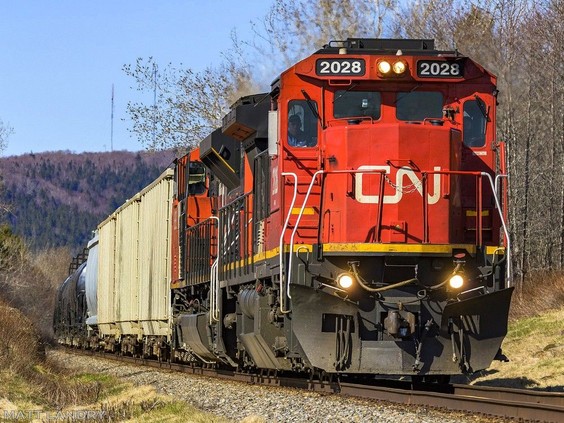
‘When rail is disrupted, it has a massive impact on the economy’
Saskatoon StarPhoenix
Workers at both of Canada’s major railroads are still without a contract, but not on strike as a federal government tribunal is preparing to begin hearing submissions on the dispute.
The Canada Industrial Relations Board (CIRB) has been asked by Labour Minister Seamus O’Regan to look at whether a disruption in rail service could have a negative impact on the country in regards to public safety. The request from the federal labour minister came after workers at both Canadian National Railway Co. and Canadian Pacific Kansas City Ltd. (CPKC) on May 1 voted to authorize strike action.
Before the dispute was referred to the CIRB, workers were in a position to walk off the job on May 22. But a strike cannot start now until the board issues a decision.
Since the dispute was referred to the tribunal, there does not appear to have been any progress made in negotiations between the two sides. CPKC reported no progress in its most recent round of bargaining, and the Teamsters Canada Rail Conference (TCRC) also recently put out a statement criticizing CN Rail for making its most recent offer public, an offer the union called inadequate.
Jean-Daniel Tardif, senior director of operations and dispute resolution at the CIRB, said the two parties have until May 31 to make their written submissions. The submissions will primarily outline their current positions in regards to the dispute.
Tardif added that a case management conference was set to be held on May 27 in Ottawa.
“We will meet the party at that time and discuss next step(s),” he said.
A number of topics can be addressed at the case management conference, including who may be called as a witness at a future hearing.
Why is the board involved?
Andrew Stevens, a professor in the faculty of business administration at the University of Regina, whose area of research includes labour and industrial relations, said the CIRB plays an important role in Canada’s labour relations system.
“Just think of it as a court dedicated almost exclusively to the interpretation in some respects and the application of labour relations law and precedent,” he said.
Labour legislation at both the federal and provincial levels generally allows for a board referral to be made for a number of potential reasons, Stevens said, including to look at the possible use of arbitration or examine which workers are essential under legislation.
Historically, he said, the board has primarily been seen as being an objective body. However, it is not uncommon for the board’s decisions to be appealed to the courts.
“It’s as impartial as the legislation and the convention of its interpretation as it exists,” he said.
Stevens said that a federal labour minister referring such a dispute to the board is not surprising given that rail is an important industry in Canada. Historically, labour disputes that have led to service stoppages in the industry have not lasted long due, in part, to intense political pressure.
“When rail is disrupted, it has a massive impact on the economy,” he said.
Several organizations and groups have raised concerns about what a potential rail strike could mean for them and their businesses. The labour dispute is also coming just as farmers on the Prairies have begun seeding for the coming season, raising concerns about farmers possibly not being able to get all the implements they need.
How long will it take?
Tardif was not able to provide a timeline in terms of when the board may hand down a decision. He said the board can reach its rulings in a number of ways, including just considering written submissions or holding full-on hearings. Ginette Brazeau, the current chair of the CIRB, will be overseeing the case.
Tardif said the tribunal will work with both sides as it looks to facilitate some sort of settlement.
“Mediation efforts will also be attempted to try to find a resolution of that situation,” he said.
The tribunal also has the ability to order that shipments of certain goods continue in the event of a labour disruption. Tardif said it was still too early in the process to say if an order like that could be forthcoming.
“The board has broad power under the Canada Labour Code to make ruling(s) that the board see(s) necessary,” he said.
What is the board looking at?
The Canada Labour Code states that “during a strike or lockout not prohibited by this Section 87.4(1) of the code) the employer, the trade union and the employees in the bargaining unit must continue the supply of services, operation of facilities or production of goods to the extent necessary to prevent an immediate and serious danger to the safety or health of the public.”
In this case, the CIRB is specifically asking for information about propane shipments on both CN Rail and CPKC, and what alternatives their clients have for the delivery of such products. It also wants information from CN Rail about shipments of heavy fuel, food and chemicals used at water-treatment plants in remote communities and elsewhere.
If the board finds that certain products are necessary to prevent an “immediate and serious danger” to the safety or health of the public, it asks what level of services or operations must continue to ensure their appropriate supply.
The CIRB was recently involved in another major labour dispute that impacted Canada’s transportation industry.
In July 2023, the board ruled a strike by 7,400 workers in British Columbia represented by the International Longshore and Warehouse Union Canada was illegal because the union did not provide the employer with the proper 72-hour strike notice. Workers had returned to the picket line after a mediator’s tentative offer was rejected.
That dispute eventually ended in August of 2023 when workers voted to accept a new four-year agreement.
mhansen@postmedia.com

